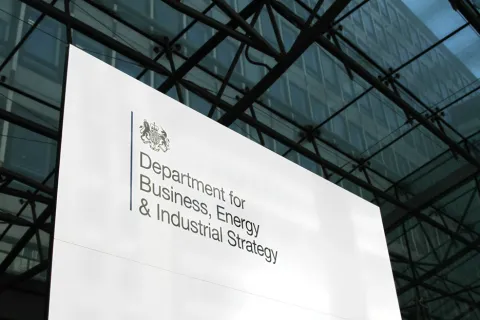
The UK’s Department for Business, Energy & Industrial Strategy published an economic regulation policy paper on 31 January 2022.
The paper introduces as the UK independent economic regulatory model attracted a large amount of private sector investment bringing benefits in the utility sectors.
It is acknowledged that the government’s Principles for Economic Regulation (2001) (accountability, focus, predictability, coherence, adaptability, efficiency) had an essential role in the success. The latter by guiding the design and evolution of the economic regulatory framework.
Notwithstanding the above, it is stated as UK’s regulatory framework needs to be reinforced and updated. For instance, taking into account reaching Net Zero, protecting the environment and enhancing digitalization. This would result in a better environment for investors and consumers, strengthening the existing framework for the current utility regulators – Ofwat, Ofgem and Ofcom.
The policy paper is divided into four sections.
On regulators’ statutory duties, it is represented as regulators will have to make effective decisions on strategic investments that will improve growth and foster sustainability, and deliver a fair deal for consumers.
To achieve the above, regulators’ must be characterized by improved transparency and predictability, with clear, consistent and future-proof duties. On the matter, the government states as it will launch a review of utilities’ regulatory statutory duties in 2022, also commissioning an analytical study on how regulators apply their duties in practice, and their relative impact on decision making/results.
On the clear strategic direction, it is mentioned as 1) there is no effective mechanism which situates the sector-specific statements within the context of government’s overarching ambition for economic regulation; 2) there are cross-cutting issues, as the need for long-term investment, climate challenge, that would need more coordination (e.g., thanks to the UK Regulators’ Network – UKRN) and cooperation between regulators.
Facing these topics would promote the systems’ transparency, predictability, independence and incentives from regulators through clear guidance on national and sectoral level priorities.
To achieve what is above, it has also been published a letter of strategic guidance to utility regulators for cooperation through the UKRN, if needed to reach an improvement in their statutory duties.
On greater competition use, the attention is on exploring potential approaches to increase competition in strategic investments. Indeed, it is highlighted that increased competition might lead to facilitate more efficient delivery of major projects to tackle long-term challenges. In particular, it might, for instance, enhance for investors and consumers 1) incentivized production of ambitious business plan at a lower cost; 2) new entrants bringing expertise and track record; 3) more information on prices and more accurate fairer returns for investors and prices for consumers, through third parties bidding; 4) opportunities for innovative green solutions.
The paper represents as regulators have made progress in increasing market competition. For instance, Ofgem introduced tenders in 2009 to grant licenses to operate transmission assets for offshore wind. BEIS and Ofgem have recently published ambitious consultations to deliver greater competition in onshore energy networks.
The government would like to better understand the merits and impacts of potential approaches to increasing competition for new strategic investments in sectors beyond the energy sector and open up areas of the value chain to competition. The latter by assessing the competition review's effectiveness and considering introducing a review mechanism as a regular tool for identifying critical opportunities for competition across the utilities.
On promoting transparency and consistency, it is stated as there are two areas in which greater regulatory consistency may encourage greater transparency for consumers, business and investors: 1) easy to navigate, create and proper methodology, that regulators use to control prices; 2) appropriate checks and balances to support the right outcome for consumers and the broader public interest through the process by which regulator decisions can be appealed.
The CMA and the UKRN collaborate to tackle the common challenges and improve the expertise of the sector regulators. This by reaching greater consistency, a common methodology, where appropriate when setting price controls.
The task force will have to consider the methodology and sources of data and the role of cross-checks, and regulators should work towards alignment where clear benefits can be identified. The policy paper represents as relevant regulators will publish findings on price control methodology in 2022. Besides, the government will launch a consultation on economic regulation in the same year to set out a coherent package of measures designed to ensure the UK model of economic regulation fits the needs of the modern age.
Starting from the report of the Regulatory Policy Committee, the UK government repeatedly expressed as Brexit is an opportunity to reform the UK’s approach to regulation and ensure to regulate in the most effective way possible, supporting growth and innovation.
However, the approach does not seem to be far away from the one of the EU Commission. Indeed, in the latest Better Regulation toolbox we find various similarities. For instance, strategic foresight is close to the UK strategic guidance (#tool20) and the same approach is presented in the competition area (#tool24). The transparency, consistency, and accountability principles are recurrently mentioned, and the future-proof approach is common in both cases.

Luca Megale
is a PhD Student at LUMSA University of Rome
and tutor of the European Master in Law and Economics - EMLE (Rome term).
Submitted on Sun, 02/13/2022 - 10:46

